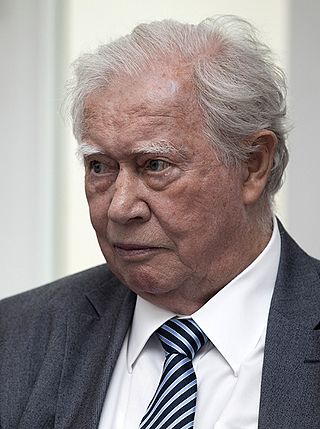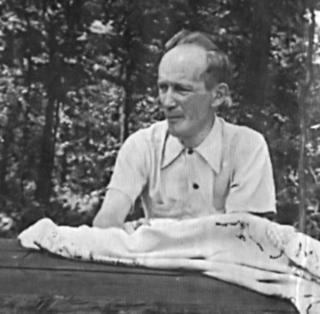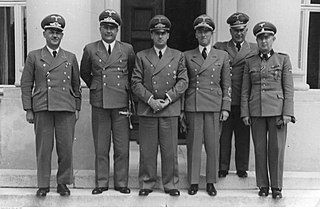The National Socialist Program, also known as the 25-point Program or the 25-point Plan, was the party program of the National Socialist German Workers' Party. Adolf Hitler announced the party's program on 24 February 1920 before approximately 2,000 people in the Munich Festival of the Hofbräuhaus and within the program was written "The leaders of the Party swear to go straight forward, if necessary to sacrifice their lives in securing fulfilment of the foregoing points" and declared the program unalterable. The National Socialist Program originated at a DAP congress in Vienna, then was taken to Munich, by the civil engineer and theorist Rudolf Jung, who having explicitly supported Hitler had been expelled from Czechoslovakia because of his political agitation.
Quentin Robert Duthie Skinner is a British intellectual historian. He is regarded as one of the founders of the Cambridge School of the history of political thought. He has won numerous prizes for his work, including the Wolfson History Prize in 1979 and the Balzan Prize in 2006. Between 1996 and 2008 he was Regius Professor of History at the University of Cambridge. He is the Emeritus Professor of the Humanities and Co-director of The Centre for the Study of the History of Political Thought at Queen Mary University of London.
The Congress for Cultural Freedom (CCF) was an anti-communist cultural organization founded on June 26, 1950 in West Berlin, and was supported by the Central Intelligence Agency (CIA). At its height, the CCF was active in thirty-five countries. In 1966 it was revealed that the CIA was instrumental in the establishment and funding of the group. The congress aimed to enlist intellectuals and opinion makers in a war of ideas against communism.

Hans Mommsen was a German historian, known for his studies in German social history, for his functionalist interpretation of the Third Reich, and especially for arguing that Adolf Hitler was a weak dictator. Descended from Nobel Prize-winning historian Theodor Mommsen, he was a member of the Social Democratic Party of Germany.
Moishe Postone was a Canadian historian, sociologist, political philosopher and social theorist. He was a professor of history at the University of Chicago, where he was part of the Committee on Jewish Studies.

Saul Friedländer is a Czech-Jewish-born historian and a professor emeritus of history at UCLA.

Roman Osipovich Rosdolsky was a prominent Ukrainian Marxian scholar, historian and political theorist. Rodolsky's book The Making of Marx's Capital, became a foundational text in the rediscovery of Marx critique of political economy. As well as influenced later scholars such as Moishe Postone.

Claudia Ann Koonz is an American historian of Nazi Germany. Koonz's critique of the role of women during the Nazi era, from a feminist perspective, has become a subject of much debate and research in itself. She is a recipient of the PEN New England Award, and a National Book Award finalist. Koonz has appeared on the podcasts Holocaust, hosted by University of California Television, and Real Dictators, hosted by Paul McGann. In the months before the 2020 United States presidential election, Koonz wrote about the risks of autocracy in the United States for History News Network and the New School's Public Seminar.
Jeffrey C. Herf is an American historian of modern Europe, particularly modern Germany. He is Distinguished University Professor of modern European history at the University of Maryland, College Park.
Volker Rolf Berghahn is a historian of German and modern European history at Columbia University. His research interests have included the fin de siècle period in Europe, the origins of World War I, and German-American relations. He received a M.A. from the University of North Carolina at Chapel Hill in 1961 and a PhD, under supervision of Francis L. Carsten, from the University of London in 1964. Prior to teaching in the United States, Berghahn worked in the United Kingdom and Germany. In 1988, he accepted a position at Brown University, and moved to Columbia ten years later.
The New German Critique is a contemporary academic journal in German studies. It is associated with the Department of German Studies at Cornell University. It "covers twentieth century political and social theory, philosophy, literature, film, media and art, reading cultural texts in the light of current theoretical debates." The executive editors are David Bathrick (Cornell), Andreas Huyssen (Columbia), and Anson Rabinbach (Princeton).
Myles W. Jackson is currently the inaugural Albers-Schönberg Professor in the History of Science at the Institute for Advanced Study in Princeton, New Jersey, and lecturer with the rank of professor of history at Princeton University. He was the inaugural Albert Gallatin Research Excellence Professor of the History of Science at New York University-Gallatin, professor of history of the faculty of arts and science of New York University, professor of the division of medical bioethics of NYU-Langone School of Medicine, faculty affiliate of the Engelberg Center on Innovation Law and Policy, NYU School of Law, and director of science and society of the college of arts and science at NYU. He was also the inaugural Dibner Family Professor of the History and Philosophy of Science and Technology at Polytechnic Institute of New York University from 2007 to 2012. The chair is named after Bern Dibner (1897–1988), an electrical engineer, industrialist, historian of science and technology and alumnus of Polytechnic Institute of Brooklyn.
Red fascism is a term equating Stalinism and other variants of Marxism–Leninism with fascism. Accusations that the leaders of the Soviet Union during the Stalin era acted as "red fascists" have come from left-wing figures who identified as anarchists, left communists, social democrats and other democratic socialists, as well as liberals, and among right-wing circles both closer to and further from the centre.
Dagmar Herzog is Distinguished Professor of History and the Daniel Rose Faculty Scholar at the Graduate Center, City University of New York.
Werner Conze was a German historian. Georg Iggers refers to him as "one of the most important historians and mentors of the post-1945 generation of West German historians." Beginning in 1998, Conze's role during the Third Reich and his successful postwar career in spite of this became a subject of great controversy among German historians.

The General Government administration, a government and administration of the General Government set up on part of that area of the Second Republic of Poland under Nazi German rule, operated during World War II between 1939 and early 1945.

The Brown Book of the Reichstag Fire and Hitler Terror is a book published in Paris, France in August 1933. It was written by an anti-fascist group which included German communist Willi Munzenberg, as well as Hans Siemsen and Gustav Regler. It put forth the theory that Nazis were behind the Reichstag fire of February 27, 1933. According to Spanish novelist Antonio Muñoz Molina it was one of the best selling books of all time.
Jean-Maurice Lahy was a French psychologist, physiologist and sociologist, and an important contributor to the European Science of Work in the early 20th century. He spearheaded a thorough critique and revision of F.W Taylor's system of scientific management, upon its introduction into French factories.
Joachim Ritter was a German philosopher and founder of the so-called Ritter School of liberal conservatism.
Norbert Frei is a German historian. He holds the Chair of Modern and Contemporary History at the University of Jena, Germany, and leads the Jena Center of 20th Century History. Frei's research work investigates how German society came to terms with Nazism and the Third Reich in the aftermath of World War II.






